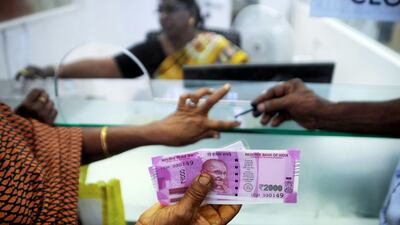"But sir, I do not have a signature of my own. I have hardly signed a paper in my life,” announced Rukmini with a distraught face. “Well, you do know some writing, so just write your name in the same way 50 to 60 times to practise,” I counselled her.
She was diligent and practised writing her name in the same style about 30 times. I had told Rukmini, our cook, that in future we would be depositing her monthly salary into a bank account instead of paying her cash.
Rukmini has worked with us in Mumbai for 27 years. She is gifted. She can turn out delectable dishes from any part of India. Her skills in pressing garments can outdo any laundry. But until recently, she collected her salary in cash every month and sent part of it to her father in a village in Maharashtra through a travelling friend or relative.
She agreed to open a bank account after some persuasion. However, to do so she needed her Aadhar identity card, which was with her family in her village. So, she spoke to her family who dispatched it. Then came another hurdle. She also needed a permanent account number (PAN) card issued by the tax department. So we visited the income tax office, to procure an application form. After filling the form with her signature and photograph, it took about a week to get her PAN sanctioned. But the tax office sent the card to her village address. After some frantic calls, it was redirected to Mumbai.
Finally, armed with her Aadhar and PAN cards, we approached the bank to open an account. We filled the voluminous form, with Rukmini signing at 12 places. I would have thought that one signature at the end of the form would suffice. Never mind. The bank accepted the form and we waited patiently.
After five days, the bank informed us that they were unable to open her account because her 12 signatures did not entirely match. Rukmini would have to fill the form again in the presence of bank officials. We explained to the bank that she is a semi-literate lady who does not normally sign papers. “Even if you ask me to sign some form at 12 spots, I am not sure that all the 12 signatures would match perfectly,” I told the bank official. He said he would have to seek the advice of his senior manager. Fortunately, the manager was pragmatic and cleared Rukmini’s bank account.
Within a week, the account was regularised. The day her ATM card arrived was a day of celebration. Rukmini was thrilled. We cut a cake. Mission accomplished. It had taken almost 27 days to open a bank account.
Now, Rukmini is petrified of the automatic teller machine. So, it will be another mountain to climb to teach her how to use it and draw her own money. We will also have to teach her how to send money every month to her father. Rukmini sought a simple solution. “I will give the PIN to someone in the office who will draw money for me,” she told me. I counselled her that she should never share her PIN.
While we were able to help Rukmini, it will be many years before the majority of Indians go cashless and digital. Cash is the lifeline of the Indian economy. It is like blood that flows through the veins. Almost 95 per cent of transactions are in cash.
Banks cover only a third of the Indian population. Credit card payments constitute only 4 per cent of transactions.
About 67 per cent of the population lives in the villages. There are a meagre 86,425 bank branches and 40,345 ATMs serving more than 800 million people in villages.
Villagers have to walk up to 15 kilometres to a bank just to draw 2,000 rupees (Dh108). Many banks do not have cash to disburse. Moreover, about 29 per cent of villagers, especially women, are illiterate. They do not know how to sign cheques. About 236,000 villages have a population below 500, and there are no banks.
While the goal of a cashless and digital India is laudable, we need to build the infrastructure of rural banking and security systems for the project to succeed.
Hari Chand Aneja is a 96-year-old former corporate executive who now keeps busy with charity work

